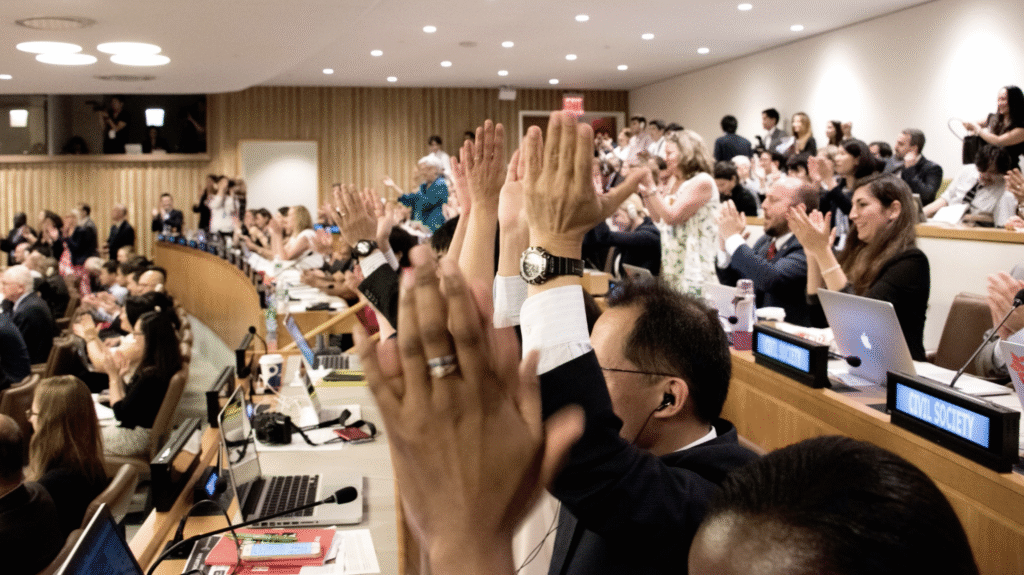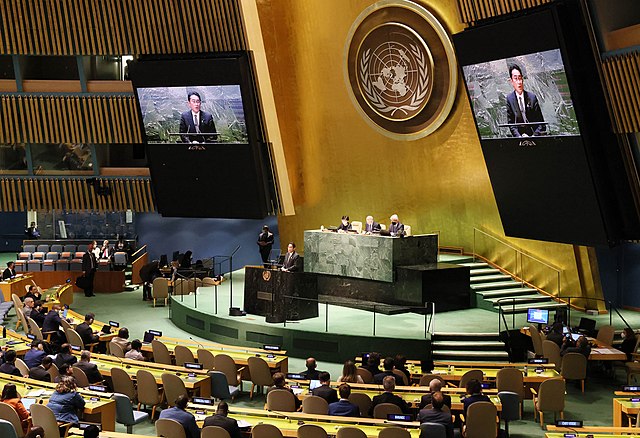
Dear Friend of SCND,
The United Nations was founded at the close of World War II – the greatest catastrophe in the history of humanity so far – with the aim of inaugurating a new world, in which international peace and prosperity was secured through a forum of transnational collaboration.
In principle, the UN was intended as a bastion against the inhumanity and barbarism of war, with the international law it drafted serving as a blueprint for diplomatic – not violent – efforts to resolve tensions and conflict between nations.
The UN has failed in many instances to realise this ideal. The world has been almost constantly at war since 1945, with the most powerful nations being the most frequent belligerents. The structure of certain UN bodies like the Security Council, which gives five nuclear powers elite status over all other nations with their veto power, has unfortunately served as an architecture of impunity for these states.
We now live in a decade engulfed in global conflict and military violence, with challenging prospects for the remainder of the century. Other than rhetorically, the UN struggles to exercise its diplomatic powers time and time again.
But none of this means that the aspirations of the UN in its original inception were themselves misguided.

The UN’s nuclear treaties are an interesting case study in both the flaws and immense potential of the institution. The Non-Proliferation Treaty (NPT), drafted and signed in 1968 by the US, Russia and the UK, has as its three pillars: non-proliferation, disarmament and a right to civilian nuclear energy. The treaty was drafted in the midst of the Cold War as an acknowledgement that the more states possessed nuclear weapons, the more likely the risk of nuclear war – the gravest ever threat to humanity.
But the NPT had an intractable contradiction baked into its design: whilst treaty obliged its 5 recognised nuclear states (US, China, Russia, UK, France) to ‘pursue disarmament in good faith,’ it did not challenge the cynical rationale of “deterrence” by which these states justify their possession of omnicide weapons.
That means that the NPT, while banning signatories from developing nuclear weapons, nevertheless implicitly supported the same “logic” of nuclear deterrence for which nations might desire them. In other words, by legitimising the possession of nuclear weapons by select, elite states, the treaty partly inadvertently reinforced, on the international stage, the arguments for possessing such weapons.
Hence the advent of several nuclear-ambitious states since the NPT was drafted, including Israel, Iran, India, Pakistan, North Korea and Saudi Arabia.
The structural hypocrisy of the NPT was made transparent during the US/Israeli attacks on Iran: Israel, a nuclear state that rejects the NPT, unilaterally attacked Iran, and NPT signatory, with the support of the US which as a depository state is required to diplomatically manage the implementation of the treaty.
The US made the case that certain allies are permitted a nuclear posture and to flaunt international law, whilst NPT signatories may be subject to violent enforcement.
To be clear: the NPT remains a vital document and an important reference for how nuclear states should conduct themselves. However, whilst certain states are permitted not just to possess but to boast about their nuclear weapons, there cannot be a sustainable non-proliferation consensus.
That is part of the reason why the Treaty on the Prohibition of Nuclear Weapons (TPNW) is such a significant achievement – one for which we should credit the UN.
The TPNW is the only article of international law that comprehensively bans nuclear weapons, including their stockpiling, production, transport and development. It is a major step forward in the international approach towards disarmament and is currently signed by half of the world’s nations. Crucially, it rejects that any state deserves special nuclear power status, eschewing the two-tiered framework of the NPT.
Supporters of the TPNW celebrated its 8th anniversary this past Monday!
Despite its shortfalls, it is the democratic aspirations, openness to civil society and profoundly humanistic orientation of the UN that led to its adoption of the historic nuclear ban treaty in 2017. It may be these qualities that make the UN still the best hope for a world without nuclear weapons, which prioritises prosperity and peace over preparing for war.
80 years of the nuclear threat was has been too many. The campaign to rid the world of these abominable weapons is advancing and you can play your part in demanding our representatives express support for the TPNW. Write to them this weekend and get them to support the ICAN pledge!
